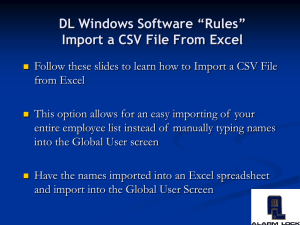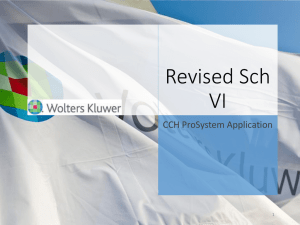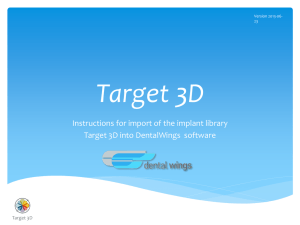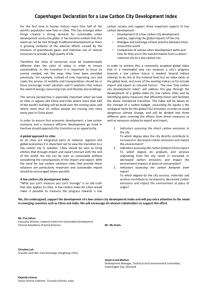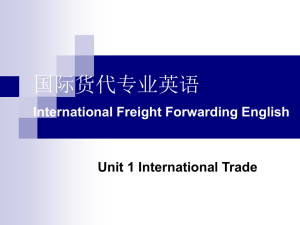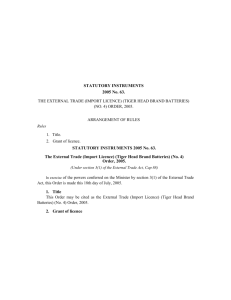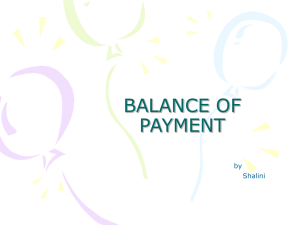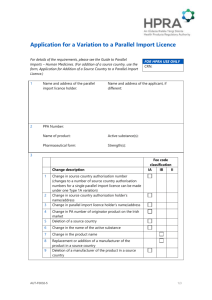chn22777
advertisement
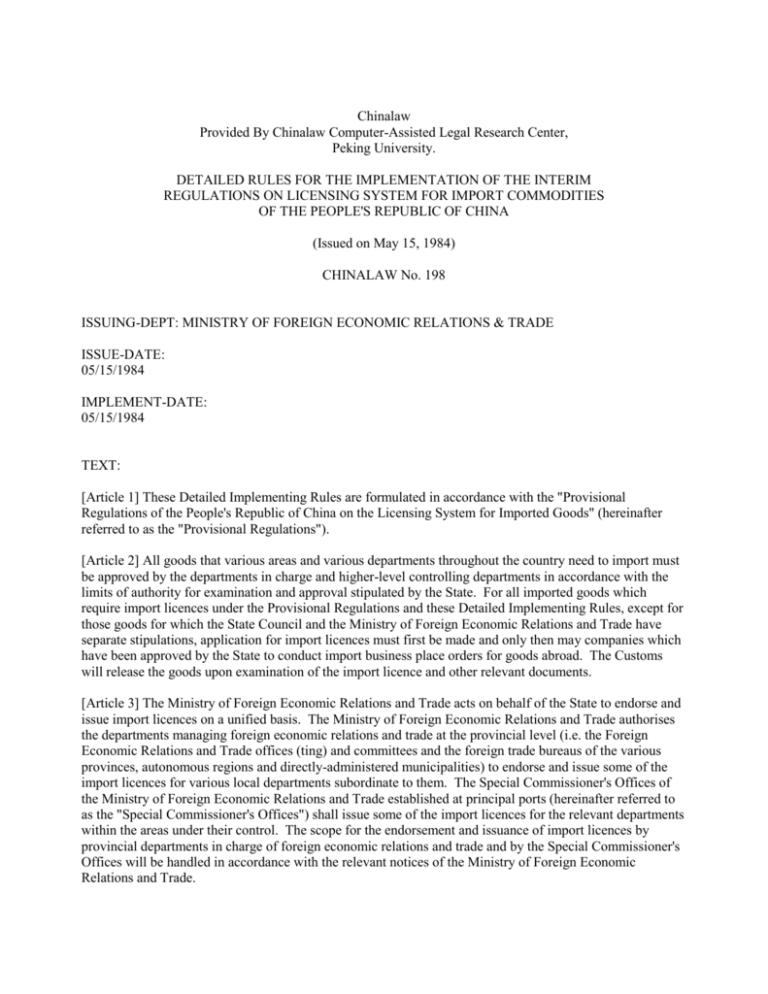
Chinalaw Provided By Chinalaw Computer-Assisted Legal Research Center, Peking University. DETAILED RULES FOR THE IMPLEMENTATION OF THE INTERIM REGULATIONS ON LICENSING SYSTEM FOR IMPORT COMMODITIES OF THE PEOPLE'S REPUBLIC OF CHINA (Issued on May 15, 1984) CHINALAW No. 198 ISSUING-DEPT: MINISTRY OF FOREIGN ECONOMIC RELATIONS & TRADE ISSUE-DATE: 05/15/1984 IMPLEMENT-DATE: 05/15/1984 TEXT: [Article 1] These Detailed Implementing Rules are formulated in accordance with the "Provisional Regulations of the People's Republic of China on the Licensing System for Imported Goods" (hereinafter referred to as the "Provisional Regulations"). [Article 2] All goods that various areas and various departments throughout the country need to import must be approved by the departments in charge and higher-level controlling departments in accordance with the limits of authority for examination and approval stipulated by the State. For all imported goods which require import licences under the Provisional Regulations and these Detailed Implementing Rules, except for those goods for which the State Council and the Ministry of Foreign Economic Relations and Trade have separate stipulations, application for import licences must first be made and only then may companies which have been approved by the State to conduct import business place orders for goods abroad. The Customs will release the goods upon examination of the import licence and other relevant documents. [Article 3] The Ministry of Foreign Economic Relations and Trade acts on behalf of the State to endorse and issue import licences on a unified basis. The Ministry of Foreign Economic Relations and Trade authorises the departments managing foreign economic relations and trade at the provincial level (i.e. the Foreign Economic Relations and Trade offices (ting) and committees and the foreign trade bureaus of the various provinces, autonomous regions and directly-administered municipalities) to endorse and issue some of the import licences for various local departments subordinate to them. The Special Commissioner's Offices of the Ministry of Foreign Economic Relations and Trade established at principal ports (hereinafter referred to as the "Special Commissioner's Offices") shall issue some of the import licences for the relevant departments within the areas under their control. The scope for the endorsement and issuance of import licences by provincial departments in charge of foreign economic relations and trade and by the Special Commissioner's Offices will be handled in accordance with the relevant notices of the Ministry of Foreign Economic Relations and Trade. The work of the provincial departments in charge of foreign economic relations and trade and the Special Commissioner's Offices in endorsing and issuing import licences is under the direct leadership and supervision of the Ministry of Foreign Economic Relations and Trade. They shall make periodic situation reports to the Ministry of Foreign Economic Relations and Trade, and they shall report as the occasion demands when important questions arise. [Article 4] All types of companies which have been approved to conduct import business in accordance with the limits of authority for examination and approval stipulated by the State Council must conduct their business in strict conformity with the approved scope of business and the import commodities list. Among the above companies, specialised foreign trade import and export corporations and their subordinate branch corporations at the provincial level, import and export corporations of the various ministries under the State Council and their directly subordinate branch corporations at the provincial level, and the foreign trade and import corporations under the provinces, autonomous regions and directlyadministered municipalities (a list of these three types of corporations will be issued separately by the Ministry of Foreign Economic Relations and Trade) shall be exempted from obtaining import licences for imported goods, except for state-restricted import goods. Imports will be released by the Customs upon examination of the relevant documents. Apart from these three types of corporations, all other types of companies conducting import business must apply for import licences for all goods imported by them. The Customs will release imported goods upon examination of their import licences and relevant certificates. Departments and enterprises which have not been approved to conduct import business by organisations authorised by the State Council are not permitted to import goods on their own. Relevant departments which need to purchase urgently needed goods in small quantities should handle matters in accordance with Articles 7 and 8 of these Detailed Implementing Rules. [Article 5] The import of goods under contracts signed with factories and businesses abroad and in Xianggang (Hong Kong) and Aomen (Macao) to process materials, assemble components, engage in compensation trade and undertake engineering projects abroad which have been approved by the relevant ministry or commission, or by the People's Government of the province, autonomous region or directlyadministered municipality (including organisations authorised by them) in accordance with the limits of authority for examination and approval stipulated by the State Council, shall go through import procedures separately in accordance with the following provisions: (1) Approved imports under contracts for processing materials or assembling components, when within the scope of the approved business and the processed and finished products to be sold abroad, are exempt from obtaining import licences. The Customs will release the imports on examination of the approval documents, the contract with the foreign party and the import documents. Materials, components, and processed and finished goods to be sold in China, which are imported with the approval of the relevant ministries, commissions and provincial departments in charge, shall be treated as ordinary imports. Among these, state-restricted import goods require the approval of the higher-level controlling department, after which application for an import licence may be made. Unrestricted import goods will be handled directly according to Customs import procedures based on the approval documents. (2) Unrestricted imports among the imports under approved contracts for compensation trade and foreign engineering projects are exempt from obtaining import licences and will be cleared by the Customs on examination of the approval documents, the contract with the foreign party and the import certificates. Staterestricted imports require initial approval by the higher-level controlling department, and application for import licence. [Article 6] The importation of all state-restricted goods, regardless of the form of import trade (except for imports of materials for processing and components for assembly from abroad under contract terms), the source of foreign exchange and the import channel requires prior initial application for an import licence. Only afterwards can orders for goods be placed by companies approved to conduct the business of importing such goods. Application for an import licence is to be made on the basis of documents approved by the State Planning Commission for state-restricted imports which have already been approved by the State Planning Commission and for which a specific product name, quantity and utilisation department has been transmitted under the state annual import plan. For goods not listed in the state annual import plan and for which a product designation, quantity or utilisation department has been transmitted under the state annual import plan. For goods not listed in the state annual import plan and for which a product designation, quantity or utilisation approval of the departments in charge and higher-level controlling department, and based on approval documents and other related certificates. Categories of state-restricted imports will be announced and revised in a unified way by the Ministry of Foreign Economic Relations and Trade (see the Appendix for present categories of state-restricted imports). [Article 7] The following imports are exempt from import licences, except for state-restricted imports: (1) Samples of advertising goods purchased or received from foreign businesses in the course of trade by all companies which have been approved to conduct import and export business in accordance with the authority for examination and approval stipulated by the State Council; (2) Urgently needed scientific research, educational, cultural, sports, medical and health articles purchased by scientific research, educational, cultural, sports, medical and health departments or by units abroad entrusted by them which have been approved by the Ministry of Foreign Economic Relations and Trade, by provincial departments managing foreign economic relations and trade or by the Special Commissioner's Offices, provided the total value of each lot is less than US$ 5,000; (3) Urgently needed spare parts or parts of machines, instruments or electrical appliances purchased by factories, mines and other enterprises, or by units abroad entrusted by them which have been approved by the Ministry of Foreign Economic Relations and Trade, or provincial departments managing foreign economic relations and trade, or Special Commissioner's Offices, provided the total value for each lot is less than US$ 5,000; and (4) Goods which have been specially approved by the State Council or the Ministry of Foreign Economic Relations and Trade as exempt from obtaining import licences. The Customs will release imports under items 2, 3 and 4 of this Article upon examination of approval documents. In the case of goods imported on their own under items 2 and 3, application for an import licence must be made if the lot exceeds US$ 5,000 in value. The Customs will release the imports upon examination of the import licence. [Article 8] Government organisations, institutions and non-production enterprises which purchase on their own small amounts of urgently needed articles abroad due to special circumstances are all required to apply for import licences. The Customs will release the goods upon examination of the import licence. [Article 9] For joint ventures using Chinese and foreign investment which have been filed for record with the Ministry of Foreign Economic Relations and Trade and obtained approval from it or from the departments in charge at the provincial level, the scope and procedures for applying for import licences for their required materials will be handled in accordance with Article 63 of the "Implementing Regulations for the Law of the People's Republic of China on Joint Ventures Using Chinese and Foreign Investment" promulgated by the State Council. Namely: (1) Equipment and materials imported by the foreign party to a joint venture, and for those staterestricted import goods among them application for an import licence may be made directly on the basis of an approved contract. Ordinary equipment and materials are exempt from obtaining import licences, and Customs will release the goods on examination of the contract and import documents; (2) Machinery, equipment, parts, raw materials, fuels imported by the Chinese-foreign joint venture itself within the scope of operations stipulated in the approved joint venture contract for its own use, and for those state-restricted import goods among them, application for an import licence must be made (if included in the joint venture's annual plan, application can be made once every six months; if not included, the higher-level controlling department must examine and approve, and then the import licence may be applied for). Unrestricted imports are exempt from obtaining import licences; and (3) For goods imported by a Chinese-foreign joint venture itself beyond the scope of its operations, it must apply for an import licence. Imports needed by state-approved cooperative joint ventures using Chinese and foreign investment within the scope of the terms of the cooperative contract will be handled in accordance with the provisions of this Article. [Article 10] In the following circumstances licence-issuing organisations shall not grant or shall rescind licences already issued: (1) Goods which the Ministry of Foreign Economic Relations and Trade decides to stop, or temporarily stop, importing; (2) Imports which are in violation of state foreign policy; (3) Imports not in accordance with the provisions of a relevant bilateral trade agreement or payments agreement; (4) Imports of medicines, foods, animals and plants, agricultural products, livestock products and marine products which fail to meet health or quarantine standards fixed by state health departments or agriculture, animal husbandry and fisheries departments; and (5) Imports harmful to state interests, or which constitute illegal practices, such as those contrary to state foreign exchange regulations, import operation channels, or expensive imports. [Article 11] Units which apply for issuance of an import licence must present to issuing offices an application letter from a unit above the office or bureau level, and must present documents approving the importation from the department in charge and the higher-level controlling department above the office (ting) or bureau level. The contents of the application letter shall include; the name of the imported goods, specifications, quantity, unit price, total price, the Chinese unit concluding the transaction, country of import origin, source of foreign exchange, mode of trade, port of import destination, the name of applying unit, etc. After examination by the licence-issuing organisation, and if in conformity with the Provisional Regulations and these Detailed Implementing Rules and other relevant regulations, and if procedures have been completed, an import licence will be issued. Only after receiving an import licence, and based on a division of business responsibility, may goods be ordered through the relevant import company. In receiving and filling out of import licences by applying units, accurate reports must be made and made clearly, and no alterations may be made without authorisation. [Article 12] Licences are valid for a one-year period. If the goods have not been imported during the period of validity, the receiving unit may apply to the issuing organisation for an extension. The issuing organisation may extend the period of validity of the licence correspondingly, based on the provisions of contracts with foreign parties. If the goods have not been ordered within a year after receiving the licence, no extension will be granted. If importation is still needed, another import licence application must be made. After receiving an import licence, applying units must properly preserve it and must not lose it. [Article 13] Violations of the Provisional Regulations and these Detailed Implementing Rules will be penalised according to the following provisions: (1) During the procedures of Customs declaration if application for an import licence has not been made, goods will be confiscated or returned by the Customs according to the circumstances. If the issuing organisation gives special approval, an import licence will be issued retroactively and the Customs will impose a fine and release the imported goods. (2) When an import licence has been forged, the Customs will confiscate all the imported goods. In serious cases fines or criminal sanctions will be imposed. (3) A fine will be imposed on those who transfer import licences according to the circumstances. (4) When an unauthorised alteration of the name or quantity of the licenced goods or the unit concluding the transaction has taken place the Customs will confiscate the imports; when there have been unauthorised alterations in the licence specifications, price, or period of validity, the Customs will release the goods after the imposition of a fine. When the country of origin has been falsified in violation of state policy concerning trading countries (regions), the Customs will confiscate, return or release the goods after the imposition of a fine. [Article 14] Goods imported by departments of the special economic zones are limited to use within the special zones and may not be resold to the interior. Goods imported by the special economic zones for their use will be handled in accordance with the State's special regulations for the special economic zones. Products of the special zones transported from the special economic zones to the interior will be released by Customs upon examination of approval documents of departments and commissions in charge under the State Council and related certificates. All imported goods transported by corporations conducting import and export business in the interior through special economic zones will be handled according to the Provisional Regulations and the provisions of these Detailed Implementing Rules. Goods imported by the Hainan Administrative Region for use within the Region or sales within the Region will be handled according to the special regulations of the State Council for Hainan. When the imported goods mentioned above and the products made of imported materials, parts and components are transported to the interior for sale, the Customs will release the goods upon examination of approval documents of departments and commissions in charge under the State Council and related certificates. [Article 15] When trading agencies in Xianggang (Hong Kong) or Aomen (Macao) of import and export corporations import goods for related interior departments, the entrusting department or the regional government is in all cases first required to apply respectively in advance for an import licence at a licenceissuing organisation. The Customs will release goods upon examination of the import licence and related certificates. [Article 16] When any regional government or department receives state-restricted imports given by manufacturers or businesses in foreign countries or the Xianggang (Hong Kong) and Aomen (Macao) regions in the course of foreign economic and trade connections, the receiving unit shall apply for an import licence based on approval documents and letters verifying the gifts from the department in charge above the office (ting) or bureau level. When a motor vehicle is received the receiving unit must apply for an import licence, based on approval documents and letters verifying the gift from the people's government of the province, autonomous region or directly-administered municipality or from the department or commission in charge under the State Council. Except for state-restricted imports, other goods given as gifts are exempt from obtaining import licences, and will be handled at the Customs according to import procedures by the receiving unit based on approval documents from the department in charge at or above the office (ting) or bureau level. All import goods and materials supplied in the form of assistance or donation by international organisations, foreign governments, foreign people-to-people organisations, and foreign friendly personages according to relevant agreements, and import goods and materials donated by overseas Chinese and compatriots in Xianggang (Hong Kong) and Aomen (Macao), are exempt from obtaining import licences, and will be handled respectively in accordance with relevant state regulations. [Article 17] Import goods for maintenance and sale on consignment under the arrangements for technical maintenance or for consignment approved by the Ministry of Foreign Economic Relations and Trade, other departments in charge under the State Council, and the departments in charge of foreign economic relations and trade of the provinces, autonomous regions or directly-administered municipalities are exempt from obtaining import licences, except for state-restricted import articles and tobacco, wine and beverages, which require application for an import licence. The Customs will release other goods upon examination of approval documents, the contract with the foreign party and related certificates. [Article 18] Imports in the form of leasing trade, imports purchased with foreign exchange earned through labour outside China, goods reimported after exporting and old goods exchanged for new ones will all be handled as ordinary import goods according to the import examination and approval procedures for application of an import licence. [Article 19] These Detailed Implementing Rules are effective from the date of promulgation. Where any previous regulations concerning the import licensing system contradict these Detailed Implementing Rules, these Detailed Implementing Rules are to govern. Matters that have not been stipulated in these Detailed Implementing Rules will be interpreted and handled in a consultative way by the Ministry of Foreign Economic Relations and Trade and Customs General Administration of the People's Republic of China. Appendix to the "Detailed Implementing Rules to the Provisional Regulations of the People's Republic of China on the Licensing System for Imported Goods" State-restricted goods which require import licences 1. Motor vehicles (i.e., all types of traffic and transport vehicles, and vehicle chassis) 2. Motorcycles (including lightweight models) 3. Bicycles (including motorised bicycles) 4. Television sets 5. Radios 6. Recorders (including dual-use machines, and players) 7. Video recording equipment (i.e., complete recording equipment and, video recording machines) 8. Electric fans 9. Electric refrigerators (i.e., less than 300 litre capacity, temperature down to 20 degrees Centigrade) 10. Washing machines (i.e., washers and driers with a clothing capacity of 3.5 kilos or less) 11. Wristwatches 12. Cameras (not including medical, underwater, aerial; and other special use cameras) 13. Electronic computers (i.e., all types of complete computers and central processing units) 14. Sound and video tape duplication equipment 15. Electronic calculators (i.e., pocket-size electronic calculators and programmable calculators, among these ten or more electronic calculators must receive a licence) 16. Copying machines The above sixteen categories of products, whether in complete sets or as components, will be treated as constituting a complete machine, and all must undergo examination, approval and the issuance of a licence. 17. Television kinescopes 18. Recording machine heads (including complete sets and components) 19. Chemical Fibre-made Fabrics: (1) Cloth (not including cloth used to open a letter of credit for conducting processing of materials for export) (2) Clothing (3) Knitted chemical fibre-made shirts and pants (4) Skirts (5) Socks (6) Mosquito netting 20. Chemical Fibre-made Monomers: (1) Polyester sections (2) Yinei acylamine (3) No. Two Benzoic Acid, No. Two Tallow (4) Pure No. Two Benzoic Acid (5) Nylon 66 (6) Polyproylene Resin (Fibre-grade use textile raw silk) 21. Chemical Fibres: (1) Adhesive rubber fibre (2) Copper amine fibre (3) Acetic acid fibre (4) Polyester fibre (5) Polyamide fibre (6) Acrylic fibre (7) Polyvinyl alcohol fibre (8) Polypropylene fibre (9) Polyvinyl chloride fibre (10) Amine fibre 22. Polycarbonates 23. ABS Resin 24. Rubber 25. Sulphuric acid 26. Sixteen southern Chinese medicines: Saiga tatarica, Rhinoceros unicornis L., R. simus Burchell, Panthera tigris L., panthera pardus L., Moschus moschiferus L., Bos taurus domesticus, Gmelin Bubalus bubalis, Hippocampus Kelloggi Jordan et Snyder, Marris pentadactyla L., Panax quinquefolium, Stermlia scaphiger Wall, Amomum cardamomum Lour., Amomum cardamomum L., Daemonorops dravo Bl., Aquilaria agallocha Box G., Crocus sativus L. 27. Blasting equipment for civil use 28. Lumber
